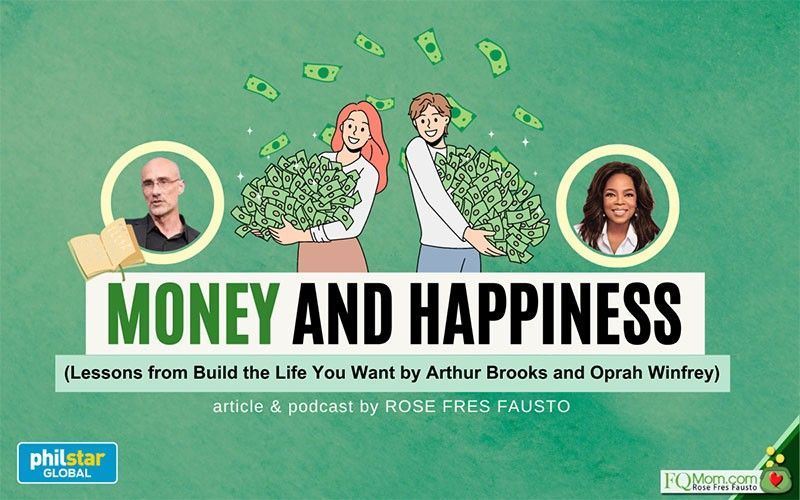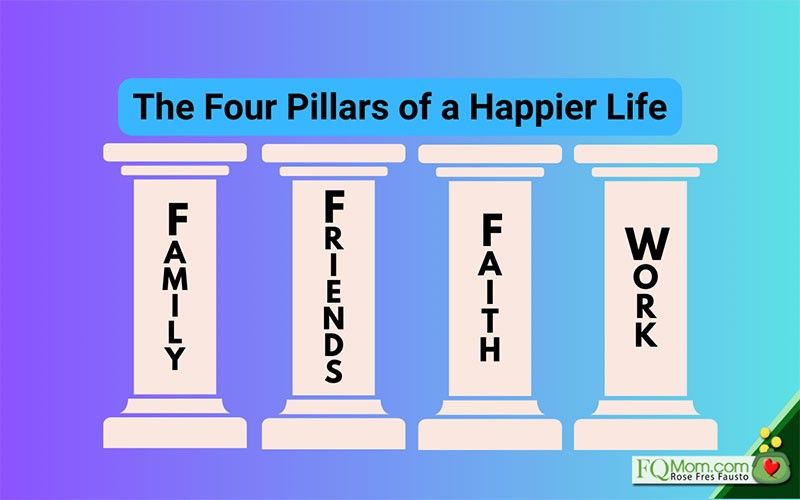Money and happiness: Lessons from 'Build the Life You Want' by Arthur Brooks, Oprah Winfrey


If you believe that too much of money and fame will make you happy such that the more you have of them, the happier you are, think again. Studies show that too much of them can make us miserable. But the difference between these two is that while you can achieve happiness without fame, there is a certain level of wealth that you need in order to be happy. It is because money is like oxygen. We can manage not to think too much and stress about it if we have an adequate supply of it. However, once the supply is cut, we won’t be able to breathe, live, much less think about happiness. This is the reason why at IFE, we always start with our values-based goals and dreams in our financial architecture. (To know more about it, click IFE free exploratory consult.) We believe that the true purpose of money is to fulfill our core values.
For today’s article, I wish to share with you some important lessons I gathered from the freshly published book of Harvard professor on happiness, Arthur Brooks and Oprah Winfrey titled "Build the Life You Want (The Art and Science of Getting Happier)."
The three macronutrients of a happier life
Just like a well-balanced diet that needs carbohydrates, fats, and proteins, we also need three macronutrients that have to be in balance to have a happier life. These are:
1. Enjoyment
Enjoyment should be differentiated from pleasure. Enjoyment is something that you create from your own effort while pleasure happens to you. Pleasure is lightheadedness you get from alcohol while enjoyment is the satisfaction of a good wine properly understood, preferably shared with others. Pleasure is addictive and animalistic while enjoyment is elective and human. Seek enjoyment instead of pleasure.
2. Satisfaction
There is a delicate balance about being content and avoiding being stagnant in life. Most of the time we work hard for something and when we achieve it, the pleasure of satisfaction seems to last only for a short period of time. We look around and see others achieving more, having more, and we become unhappy. Understanding that the feeling of satisfaction is not biologically designed to last forever will make us, well, more satisfied with our achievements. Brooks explains homeostasis to illustrate this - our body is hardwired to seek balance from extreme physical and emotional states and return to baseline state; otherwise, we overheat!
3. Purpose
This is finding the meaning of your life. We have discussed this in our past articles and my favorite way to explain it is by borrowing the Japanese philosophy of Ikigai – intersection of that which you are fond of, good at, can earn from, and what the world needs from you.
To help you remember these three macronutrients to a happier life, remember ESP. This time it’s not extra sensory power but enjoyment, satisfaction and purpose.

The four pillars of a happier life
If we have ESP for the macronutrients, we have 3Fs+W for this section. These are:
1. Family
Acknowledge that our family is both the source of our happiness and unhappiness. By the way happiness is not the absence of unhappiness, because we need to experience both positivity and negativity in order to live a full life. A happy family is not one without conflicts but one that knows how to deal with them through communication and with love. If you are one of those who have thrown in the towel and have given up on any member of your family, you are missing out on something very important. The members of your family are in a mystical way YOU! Your spouse is a completion of you as a person, your children provide a rare glimpse into your own past. Your parents are a vision of your future. Your siblings are a representation of how others see you. Giving up on them means losing valuable insight into yourself, a lost opportunity to gain self-knowledge and make progress as a person.
2. Friends
Deep friendships don’t just happen but require effort, attention, time and shared purpose. In a supposedly connected world, we are getting more disconnected. The percentage of Americans with fewer than three close friends has doubled since 1990. One in every 6 Americans has stopped talking to some friends since 2016 (election year of Trump). I wouldn’t be surprised if our figures in the Philippines are the same or even worse, especially because we just had a very contentious elections last year.
Moreover, our fixation on our screens and social media has made it easier for us to be alone, physically away from other people for longer periods of time. We are social beings in need of human interaction and I love the analogy Brooks uses in the book. Getting your needed socialization from social media interactions is like eating junk food. You may feel full with all the likes and positive comments you get on your posts but such interactions are not as nutritious as real and deep friendships that you truly need. The rule of thumb is to have at least one close friend aside from your spouse and up to ten good friends that you can realistically spend enough time with.
Unlike the first pillar (we did not choose our family members, except for our spouse), we can choose who we want them to be in this second pillar of happiness. Now, start going through your directory and start being more deliberate in coming up with meaningful physical interactions with your chosen friends.
3. Faith
Brooks is a Catholic but he does not prescribe that only your Catholic faith can give you this needed pillar to a happier life. By faith, he means a life philosophy that is transcendental to the individual. The problem is that practicing your faith has become less and less popular. But look around you, who are the people that you know who are truly happy? Aren’t they the ones who live by their faith and life philosophy? They start with the search for truth and love of others, then eventually leads them to a happier life. As in the other pillars, this needs consistency. You can start by allotting 15 minutes in contemplation and prayer. At the beginning, this may seem too long but as you get the hang of it, the 15 minutes will eventually feel too short. Faith brings us communion with others, allowing us to love others and be loved by others.
4. Work
Work is love made visible. Work is a great source of satisfaction. You feel happy when your hard work is rewarded. When you see the faces of the people you touch and who need you, it can transform a job that you hate to a job that you love. Brooks discusses various ways to find happiness in work – seek intrinsic satisfaction from work, know that there is not just one path to successful career, refrain from work addiction, remember that you are not your job by having space from your work. He shares lessons from Jose Maria Escriva who said, “Through our work, we passionately love the world. God waits for us everyday – in the laboratory, in the operating table, in the army barracks, in the university, in the factory, in the work shop, in the fields, in the home, and in all the immense panorama of work.” If we understand this well, we will realize that there is something holy and divine hidden in the most ordinary work situations and it is up to each one of us to discover it.

The best way to really learn and absorb these happiness lessons is to teach and share them with others. This is the reason why I am writing this article now, soon after I finished the book. I hope you will apply the lessons and have a happier life. May I request you to also teach and share these lessons with others?
ANNOUNCEMENTS
1. Having a high FQ is ensuring that you have this “oxygen” to live a happier life, take the FQ test now to see where you are in your FQ journey. Click here.

2. If you want to enhance your FQ, get your copy of the FQ books. They are also good gift ideas for this coming Christmas.

3. Watch the Economic Briefing of ACERD (Ateneo Center for Economic Research and Development) on Sept. 28, 2023 3:00 – 5:30 p.m. at the Makati Sports Club. You may scan the QR code to register.




















